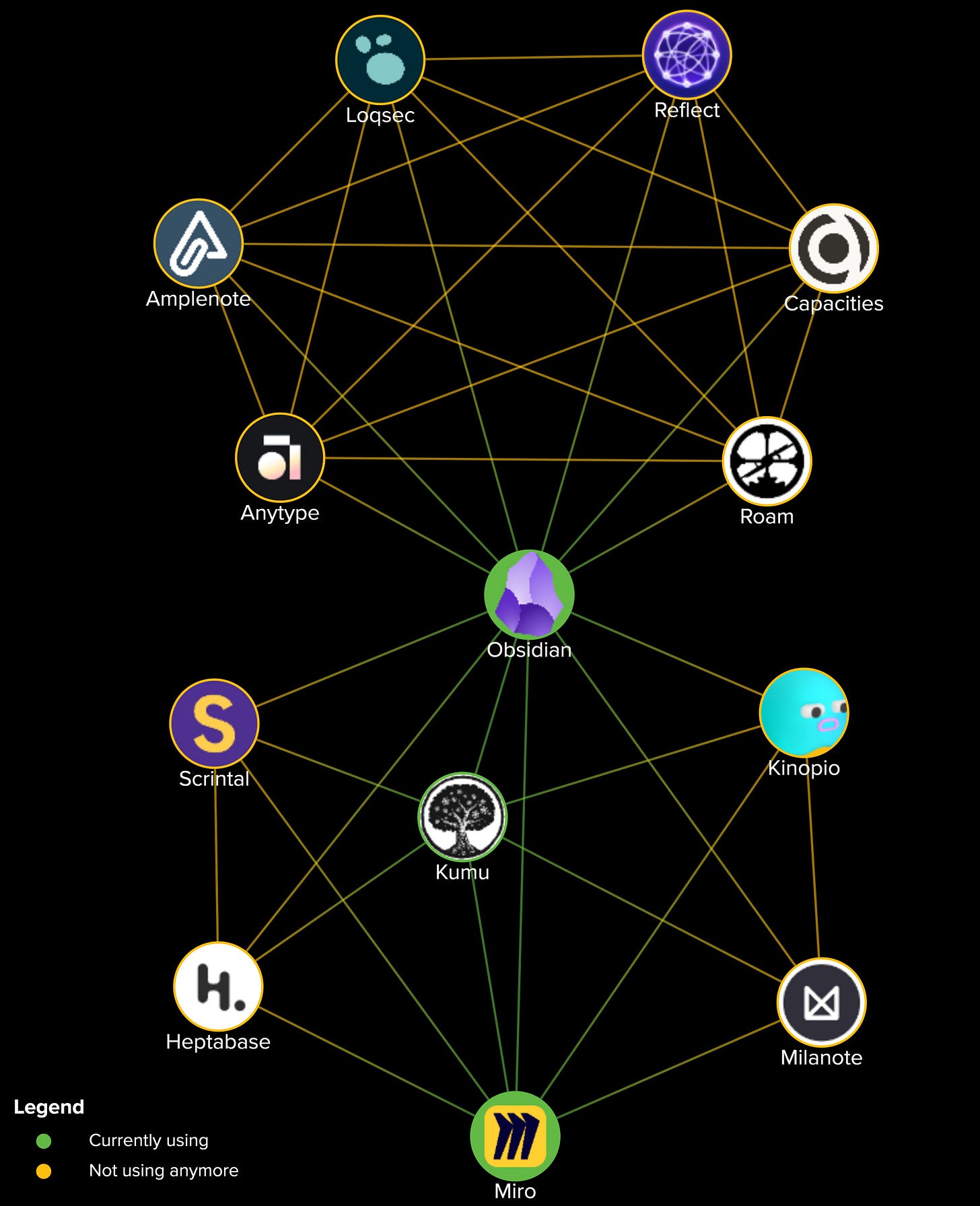From ‘Building a Second Brain’
Your professional success and quality of life directly depend on your ability to manage the information around you.
—Tiago Forte
For years I’ve been building a second brain — a digital knowledge base designed for my future self — which now serves as the bedrock for my everyday writing and work.
However, the traditional method of 'organizing' information into folders began to feel too rigid and linear — as our brains don’t work like siloed computer folders, but networked ecosystems.
Are there tools out there that allow for more entangled and emergent thought?

To ‘Cultivating a Digital Garden’
Nothing in an ecology stands alone.
— Nora Bateson
It’s been a year since I switched from Notion to the networked note-taking tools Obsidian and Heptabase. It completely changed how I manage information. I don’t worry about organization anymore — I simply link my thinking, and let the structure emerge by itself.
Here’s a video of the one-year evolution of my notes in Obsidian.
By visualizing the relationships between notes you can find hidden patterns, cross-pollinate between ideas and see how the parts relate to the whole.
For example, below I created a summary of The Web of Meaning by Jeremy Lent, showcasing how the different terms like holarchy, fractal and self-organisation relate to each other.
To me, networked note-taking tools feel more intuitive, adaptive and resilient — coming closer to a computer-mind symbiosis.
Are you ready to cultivate an evolving ecology of thought? Below I created a short synthesis with my favourite networked tools 👇
We become what we behold. We shape our tools, and thereafter our tools shape us.
― Marshall McLuhan
My favourite Tools for Networked Thought
Obsidian
Powerful tool for networked note-taking. Can do it ALL. Hundreds of plugins. Endless customizability. And an endless learning curve… It also includes a superfast Miro-like infinite Canvas.
Heptabase
I recently made to switch from Obsidian to Heptabase, as it blends the best features of Miro/Obsidian/Notion together to help you visually make sense of your learning, research, and projects.
PS: as I fell in love with the Heptabase so much, I became a Heptabase affiliate 🥳 If you become a paying subscriber through the link below, you help support my work at no extra cost to you 🙏
Kumu
My go-to tool for creating interactive systems and stakeholder maps.
Miro
A visual workspace for brainstorming, communication and project management — great for collaboration.
Other Noteworthy Mentions
Other tools I’ve experimented with (but don’t use anymore).
Scrintal
Easy-to-use Heptabase alternative to collect, connect & visually see everything on an open canvas.
Capacities
Link books, people, ideas and much more in simple and intuitive ways.
Anytype
A local-first and peer-to-peer crossover between Notion, Obsidian and Apple Notes.
Reflect
A minimalist & AI-powered Obsidian alternative.
Amplenote
Brings together your notes, tasks, ideas and calendar.
Logseq
A privacy-first, open-source networked knowledge base.
Roam Research
A note-taking tool for networked thought for researchers.
Milanote
Easy-to-use tool to organize ideas and projects into visual boards.
Kinopio
Fun space to mindmap, moodboard, research, whiteboard, brainstorm, plan, and take notes.
Dive Deeper
Here are some resources I found useful for getting started with digital gardening:
My simple note-taking setup | Zettelkasten in Obsidian | Step-by-step guide
Zettelkasten: networked note-taking for naturally networked thought
Pro-tip: Don’t transfer everything from one system to another. Only transfer something when you actually need it. This will save you lots of time.
What are your experiences with digital gardening? Let me know if you’d like to learn more about how I use Obsidian or Kumu for digital gardening 🌱
When we try to pick out anything by itself, we find it hitched to everything else in the universe.
― John Muir



















Thanks for sharing your reflection on personal knowledge management/zettelkasten etc. Tijn. I've been using Tana for my knowledge gardening for 18 months, and Roam for a year before that. I'd strongly recommend having a look at Tana. The functionality - including AI functionality - is improving all the time and there's a great community of users. Tana moved to Beta, and paid subscriptions, just a couple of weeks ago. Here is their blurb about their Personal Knowledge Management capabilities. https://tana.inc/pkm
Helpful perspective Tijn. Thanks for sharing. I’ve been enjoying Obsidian on my desktop for just over a year now. Mural which is similar to Miro has been a daily tool for 4 years. Kumu when wanting to formalise and even loopy is helpful for playing with causal loop concepts (https://ncase.me/loopy/). Then lots of physical whiteboarding, paper and pen sketches, regular reflection while sitting in the garden and doing gardening helps with the somatic processing. Will eventually take the plunge and pay for Obsidian too so I can sync across devices.